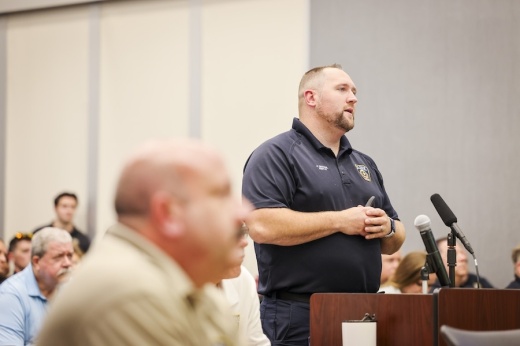Officials created the program in response to growing concerns about stress weighing on first responders. Paramedic James “Logan” Moyer highlighted how first responders often go into high-stress situations with limited information to contain situations, which can lead to chronic stress.
“One thing throughout the media, whenever they report on stories like this, what they don’t address or even mention is the fact that these calls weigh on our members,” Moyer said. “That these have emotional effects for every single one of those members that responded to this call.”
Moyer said first responders quickly get to work trying to find and treat those who may be injured and contain fires or other emergency situations. When things do not go according to plan or take longer than expected, they may experience self-doubt later on, he said.
“Emotions overwhelm us in the moment, and once that moment passes and they finish with their current tasks, it comes out,” Moyer said. “Every thought has an emotion attached to it before it can be processed with the frontal lobe, the rational part of the brain. So every thought we have has an emotion attached to it and when they build up, build up, build up, we can’t actually process it, then when we stop, boom, it shows up.”
Moyer presented statistics showing first responders are more likely to suffer from mental illness and relationship issues. Male first responders are 20% more likely to get a divorce than the general population, and female first responders are 30% more likely, he said. About 6% of the general population have post-traumatic stress and 11% deal with first responder post-traumatic stress.
Developing the program
To facilitate healthy conversations around the stressors of the job and allow staff members to get the mental health support they need, officials with the Cy-Fair Fire Department worked to create a support program.
The first step is the creation of a peer support team, which will consist of 15-25 team members from all divisions within the department that will be trained in assisting those in crisis, Moyer said. Three to five team leaders will be selected from that group and will receive even more in-depth training such as suicide prevention.
The leaders will work with a health and safety officer to ensure that procedures are followed and the person in need is referred to the appropriate resources. Assistance is confidential, so those who reach out do not face social stigma around seeking help, officials said.
According to Moyer, the team will respond when certain situations arise, such as suicide by a colleague or other unexpected deaths; death in the field; severe injury in the field; serious member injuries; serious and multicasualty incidents; police shootings or accidental wounding or killing of an innocent person; death of a child or violence to a child; prolonged incidents and other high-stress, difficult situations. Team members can also reach out when they see their peers struggling, and staff members can reach out whenever they need support.
The second part of the program is the implementation of a proactive mental health program to address a person’s spiritual, financial, physical, emotional, social, intellectual and occupational domains. Officials said this will help the department build resistance and resilience among its ranks, helping the team fortify their minds against the events they respond to.
“We already are implementing some of these aspects,” Moyer said. “So we have the physical; we do the life scans. These are beneficial for our department. We have workout equipment and certified personal trainers. Under social, we have social events where we’re able to go out together and spend time with our families.”
The department also has training to fulfill the intellectual sector, financial classes and more training for the occupational portion. While implementing the mental health program, the department would be adding on spiritual and emotional support programs as well as bolstering the wellness domains that it currently caters toward.
“It’s important we promote that culture of resilience and help mitigate the challenges of the fire and EMS profession by addressing stigmas,” Moyer said. “That’s a big one. We have this mentality of, 'We help others; I don’t need help. I’m not weak; I can’t show weakness.' In some of the studies I was reviewing, repeated interactions with those seeking mental health in the field actually causes [them] to default to, ‘I’m not as bad as this person, so I don’t need to get help.’ But in reality, it’s not weakness to say, 'Hey, maybe I need to kind of navigate through this a little bit.’”
Working alongside the support team will be a network of resources that the team will be able to refer their peers to when needed. The department is looking to work with Amy Wine Counseling Center to set up a relationship with it in order to provide the staff with a connection to counseling.
“A peer support team provides a method of long-term recognition and care for our members in a way that is unique and effective, based on research,” Moyer said.





